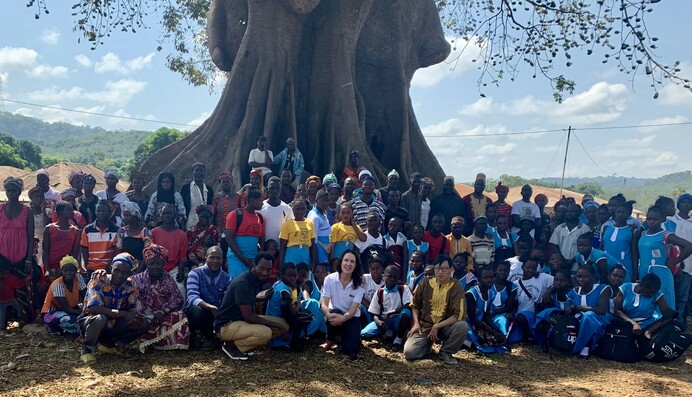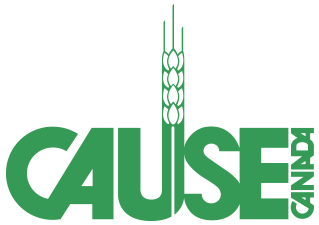Albertans Combating Gender Inequality: CAUSE Canada
“We’re not the changemakers; we empower them.” - Wendy Fehr

Image: CAUSE Canada's FIT-Funded project in Sierra Leone. Pictured above is Wendy with the project target community and local CAUSE Canada staff.
----
The first story in ACGC’s 5-part series on the contributions of Albertans in the fight against gender inequality features Wendy Fehr, Executive Director of CAUSE Canada. CAUSE is a Christian organization that “works to eliminate extreme poverty by providing access to quality educational programs, basic health care, and economic opportunities”, in addition to providing emergency support when needed. CAUSE Canada primarily operates in West Africa and Central America. This story focuses on CAUSE Canada’s highly successful FIT (Fund for Innovation and Transformation) project in Sierra Leone combating child marriage. For a detailed project description, please click here.
Disclaimer: Details and quotes below are taken directly from the interview with Wendy, unless otherwise noted.
About CAUSE Canada
Across all areas of work, there is a key element that CAUSE Canada looks at: gender inequality. Wendy explains: “gender inequality is one of those pervasive issues through all of the projects that we do. We look at how gender inequality is perpetuating, or even causing issues related to poverty.”
Wendy highlighted that one of their current projects, PODER (“I can” or “Power” in Spanish), in Central America and funded by Global Affairs Canada, is a great example of how gender equality is central to how they work. This adolescent-focused project’s main objectives are to decrease adolescent pregnancy and decrease sexual and gender-based violence. CAUSE Canada takes a holistic approach to addressing these issues, such as working with parents, teachers, community leaders, and municipal governments to support the protection of women and children from violence.
This program has been incredibly empowering for youth, equipping them with knowledge in order to advocate for themselves to the municipal government. The impact is impressive, and far reaching: “The municipal government in Honduras has now mandated all hospitals in the area to have an adolescent-friendly area and has also agreed to meet with the Youth Council annually,” explains Wendy. She noted that this was a really cool, and surprising, outcome of the program. To read about more of CAUSE Canada’s projects, please visit here, and to read regular updates from CAUSE Canada, please view their blog here, as well as their most recent news update here.
Creating spaces for the most vulnerable to speak up and listening to them have been game-changers in CAUSE Canada’s work. “I like to think of ourselves as the backdrop to those who need to be speaking,” says Wendy and that “you have to allow people who will benefit from the project to drive the boat”. CAUSE Canada’s local project staff start any project from the field, by surveying and consulting with the community, and Wendy credits them as being “so dedicated and very committed to working in solidarity. I have so much respect for the work they do and their knowledge.”

Image: CAUSE Canada logo
----
Child Marriage in Sierra Leone
“Child marriage is 100% an issue of poverty,” says Wendy, but gender inequality also plays a huge role, because in many countries, girls are often seen as less valuable than boys. “When you marry a girl who is younger, she is less expensive. When she has less education, it costs less money to marry her. Families both see it as beneficial for them if they have one less mouth to feed and as a way to get money sooner.” On the other side, men who take child brides often see them as “good workers, able to have more children, and overall more obedient.”
One of the key targets of this program was the decision-makers in the community, typically men, whose approval is necessary for child marriages to take place. While it makes sense to work directly with the young girls and empower them, it was crucial for CAUSE Canada not to make the “survivor fight her own battle.” Instead, the approach was to empower influencers who could work with the decision-makers, such as community leaders, members of the girls’ families, and the men marrying the girls.
When asked about the FIT-funded project, it is obvious that Wendy is incredibly happy with the results. A goal of 50% reduction in child marriage in the target communities actually ended up turning into a 92-94% reduction. “I really believe we can end child marriage,” says Wendy, and that it comes down to seeing girls and women as property, combined with extreme poverty. Messaging has a role in reducing the prevalence of child marriage, and CAUSE Canada’s key messaging was centered around the fact that “it is in EVERYONE’S best interest not to marry a girl until she’s 18,” as for so long, the conversation around child marriage had primarily been about the girls rather than the impact on the entire community.
The project implementation was driven by the local staff, and Wendy views them as the experts, which is how CAUSE Canada was able to navigate cultural or religious differences in the target communities. She also makes note of the immense respect from Sierra Leoneans, referencing how they start meetings with both Christian and Islamic prayers (Sierra Leone is predominantly Christian, Catholic, and Muslim). “Differences make us better, and there is a lot of value to that.”
What can Albertans do?
Wendy sees Albertans as very globally aware, noting the wonderful international development and activist community in Alberta. It is important to understand that little things matter and are doable and can have a massive impact. Making a difference is not as far-fetched an idea as it may seem.
CAUSE Canada is soon launching a campaign to focus on how to help women and girls be the change and those who are interested can support by volunteering their time or donating. For Mother’s Day, CAUSE Canada runs a care package campaign where they partner with women-led Canadian businesses to create care packages, the proceeds of which are entirely donated to women-led initiatives in Guatemala, Honduras, and Sierra Leone. To read about a previous care package, please visit here.
To donate to CAUSE Canada, please visit this link.
Through the interview with Wendy, two things become clear: empowering communities is one of the greatest ways to reduce poverty and combat gender inequality, and CAUSE Canada really, really, really cares about the work they do.